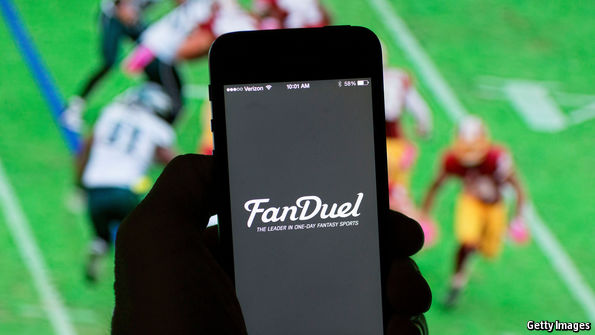Have you heard about the online fantasy gaming controversy? Confused? Here’s a helpful article from the Economist and a video from the Wall Street Journal.
EVERY week during the National Football League (NFL) season, millions of fans pay to enter tournaments online. They choose their own “fantasy” teams of players to compete against each other, picking star athletes from various NFL teams, in the hope that the performances of these stars in the real on-field contests each Sunday will earn them jackpots of as much as $1m. The allure of instant riches, heavily advertised on television in America, has changed how many fans watch games. But since online wagering is banned in most of America, it seems odd that this pastime is legal at all.
Indeed, for years the “daily fantasy sports” industry has escaped the scrutiny of regulators. Now they are paying much closer attention. In late September a scandal erupted over the alleged use of inside information. A rough few weeks followed for the two dominant daily-fantasy companies, FanDuel and DraftKings. Contestants filed several class-action lawsuits alleging that the games were unfair, and New York’s attorney-general, the FBI and a federal grand jury in Florida began sniffing into the businesses. On November 10th, New York’s attorney-general told FanDuel and DraftKings to stop taking bets from New Yorkers.
The long-term question is whether Congress will step in to ban daily fantasy sports, as it did with online poker in 2006. Fantasy sports were specifically exempted from that federal ban, at the behest of professional sports leagues that benefit from increased fan interest in their games. But the definition of “fantasy sports” has since mutated. For decades fans have enjoyed fantasy-sports leagues in which they assemble teams that compete for a prize over a whole season, often just with a group of friends. With FanDuel and DraftKings (and competitors including Yahoo), fans can choose a new fantasy team for each day on which their sport has games going. For the NFL, the most popular fantasy sport, contestants invest a fixed amount of (imaginary) money, spending from that budget on a quarterback, running backs, receivers and the like; each player comes with his own price tag, set internally by the fantasy-sports businesses. The idea is to assemble a team that amasses the most touchdowns, yards gained and other key statistics. FanDuel and DraftKings say that, combined, they will pay out at least $3 billion in fantasy-sports winnings this year.
This sounds like a fun way to make money, both for contestants and for the businesses. But two problems threaten the fast rise of these two companies, and of daily fantasy sports. The first is the similarity to online gambling, which prompted Nevada, a state unusually sensitive about threats to the offline sort, to treat it as such and may soon lead to legislative action. Second, there is the question of whether the contest is being offered on the level. The current scandal began on September 27th when data about player selections leaked from DraftKings—and then an employee with access to those data won $350,000 in the same week at FanDuel. Employees of both companies had been active fantasy-sports participants themselves, and the leak suggested that at least some have access to sensitive information that could give them an edge (though DraftKings said the leak occurred too late to benefit the employee in question). Both sites have now banned employees from taking part in a competitor’s daily sports-fantasy offerings. (They were already banned from their own.)
In a weird way, the scandal over inside information may undermine the argument that fantasy sports are gambling. If having more information can help a contestant win, that makes the contest a game of skill, as the operators argue. The problem is that casual players cannot hope to compete with the sharks online and their technical know-how, including data-sorting and algorithms. This means that, for most punters, the instant-millionaire contests are not skill-based but faith-based—that may be worse in a way than gambling, where at least everyone has the same odds.
Fantasy players are not easily deterred, though. According to SuperLobby.com, which tracks the industry, entries and fees climbed to record highs for NFL games in the week of October 11th, after a week of negative publicity (and then dipped slightly after Nevada’s gambling ban). The scandal may have reinforced the sentiment among millions of gamblers—or, rather, contestants—that, with enough hard work and luck, they could hit the jackpot someday. Even if it is not legally defined as a jackpot. Yet.





